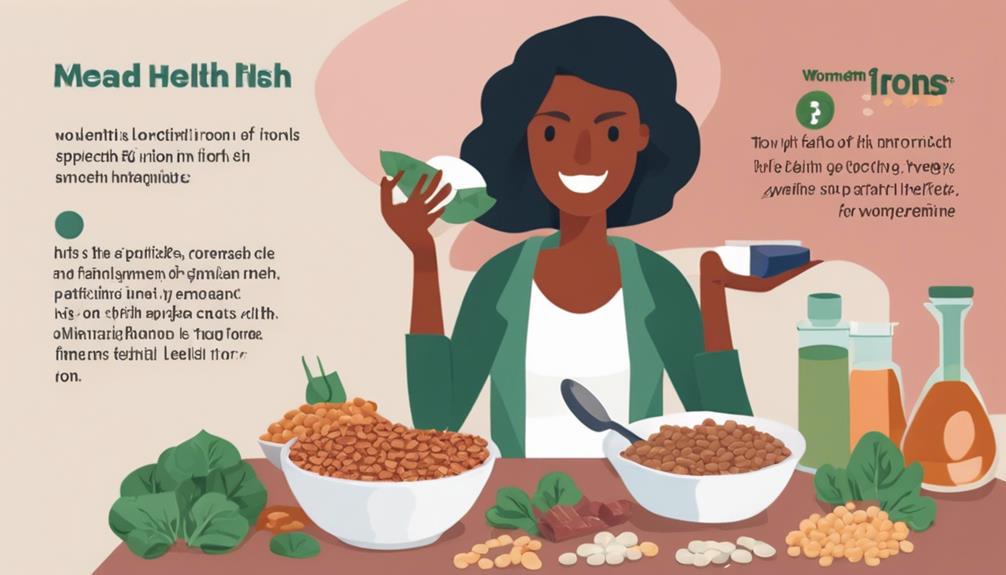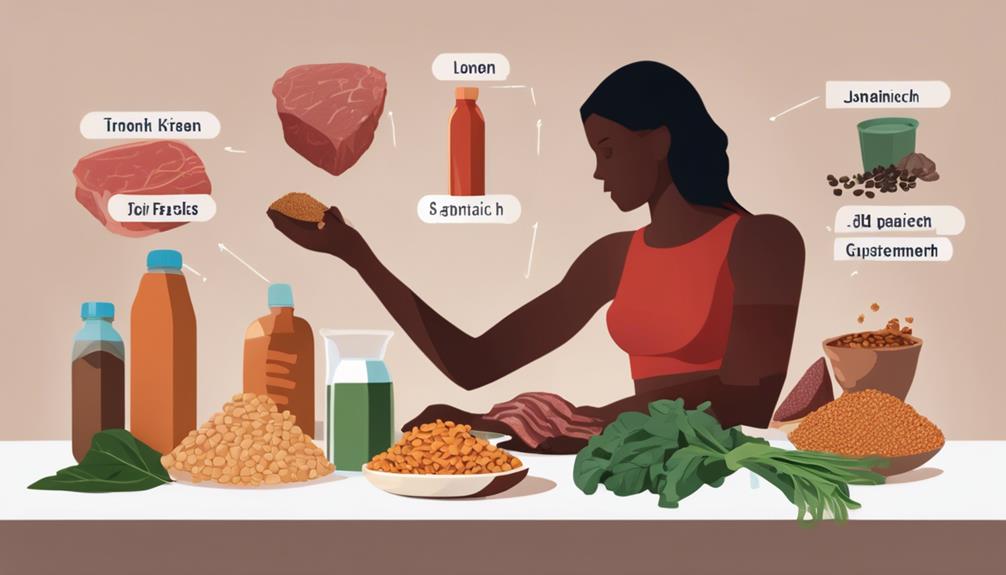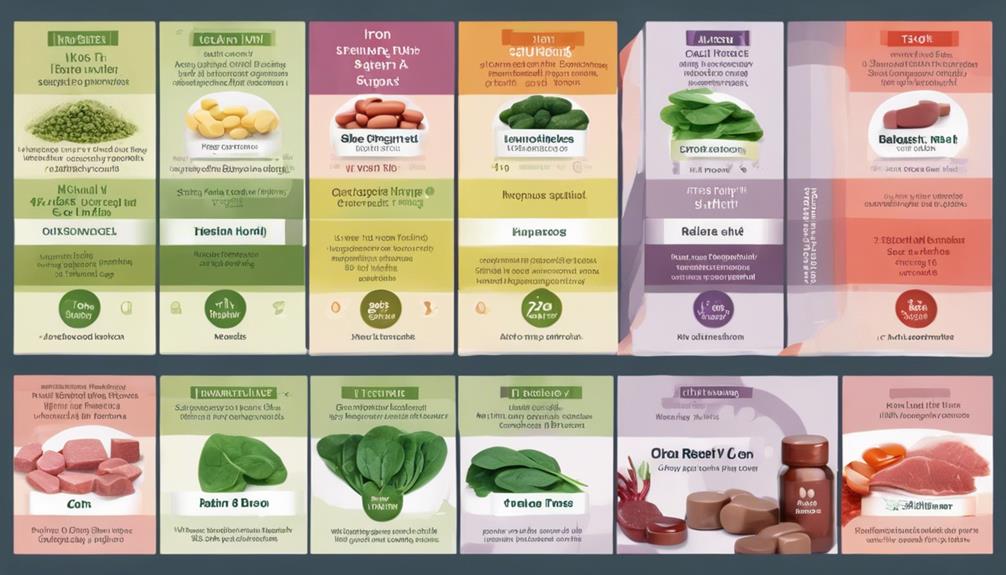Best Supplements for Women With Low Iron Levels
If you've struggled with iron supplements causing stomach discomfort in the past, you may be hesitant to try another option. However, finding the right supplement can make a significant difference in managing low iron levels effectively. Among the various choices available, iron bisglycinate stands out for its gentle impact on digestion and high absorption rate. This supplement can be a game-changer for women dealing with iron deficiency, offering promising results without the usual discomfort associated with traditional iron supplements.
Iron Supplements Overview
If you're struggling with low iron levels, iron supplements can play a crucial role in replenishing your body's iron stores. Iron deficiency is a common issue, especially among women, and can lead to symptoms such as fatigue, weakness, pale skin, and cold hands and feet. Understanding iron absorption factors is essential for effectively managing iron levels.
Factors like vitamin C intake, which enhances iron absorption, and tannins found in tea, which can inhibit iron absorption, are crucial to consider. Additionally, heme iron from animal sources is more readily absorbed than non-heme iron from plant sources. To maximize iron absorption, it's recommended to consume iron-rich foods alongside vitamin C sources.
If you suspect iron deficiency, consulting with a healthcare provider for proper diagnosis and guidance on iron supplementation is advisable. Remember, maintaining optimal iron levels is vital for overall health and well-being.
Ferrous Sulfate
When addressing low iron levels, one commonly recommended iron supplement is ferrous sulfate. Ferrous sulfate benefits women with low iron by helping to replenish their iron stores effectively. This supplement provides a high concentration of elemental iron, making it an efficient choice for boosting iron levels.
To optimize iron absorption, consider taking ferrous sulfate with vitamin C-rich foods or supplements. Vitamin C enhances iron absorption, ensuring that your body can make the most of the supplement. Additionally, it's advisable to avoid consuming calcium-rich foods or supplements at the same time as ferrous sulfate, as calcium can inhibit iron absorption.
Taking ferrous sulfate on an empty stomach can enhance its absorption, but if it causes stomach upset, try taking it with a small snack. By following these iron absorption strategies and incorporating ferrous sulfate into your routine, you can effectively combat low iron levels and improve your overall health.
Ferrous Gluconate
Ferrous gluconate is another iron supplement that can be beneficial for women with low iron levels. This form of iron is well-absorbed by the body, making it an effective option to boost your iron levels.
When taking ferrous gluconate, it's important to consider iron absorption. To enhance absorption, it's recommended to take this supplement on an empty stomach or with vitamin C-rich foods.
Like other iron supplements, ferrous gluconate may come with some side effects. Common side effects may include constipation, stomach upset, or dark stools. To minimize these side effects, ensure you're taking the supplement as directed and consider gradually increasing your dosage to allow your body to adjust.
If you experience severe side effects or discomfort, it's crucial to consult with your healthcare provider. They can provide guidance on managing side effects or recommend alternative iron supplements that may better suit your needs. Remember, consistency in taking your iron supplement and monitoring your iron levels are key to improving your overall health.
Ferric Pyrophosphate
Considered a highly bioavailable form of iron, ferric pyrophosphate is a beneficial supplement for women with low iron levels. This type of iron is known for its excellent absorption rates, making it an efficient choice to address iron deficiency. To further enhance your understanding, let's take a look at some key dietary sources of ferric pyrophosphate:
| Dietary Sources of Ferric Pyrophosphate | Iron Content (per serving) |
|---|---|
| Fortified cereals | Varies |
| Fortified oatmeal | Varies |
| Fortified bread | Varies |
| Fortified pasta | Varies |
| Fortified rice | Varies |
Heme Iron Polypeptide
To broaden your understanding of iron supplements suitable for women with low iron levels, let's shift our focus to Heme Iron Polypeptide.
Heme Iron Polypeptide is a form of iron that's derived from animal sources and is known for its high absorption rates compared to non-heme iron sources like ferric pyrophosphate. This means that your body may be able to utilize heme iron polypeptide more efficiently, potentially aiding in replenishing your iron levels effectively.
When it comes to side effects, Heme Iron Polypeptide is generally well-tolerated by most individuals. Common side effects, such as constipation or stomach upset, which are often associated with other iron supplements, are less likely to occur with heme iron polypeptide due to its higher absorption rates. However, as with any supplement, it's essential to consult with your healthcare provider before starting a new iron regimen to determine the most suitable option for your specific needs.
Iron Bisglycinate
Derived from the amino acid glycine, Iron Bisglycinate is a form of iron supplement that is highly bioavailable and gentle on the stomach. This type of iron is particularly beneficial for individuals with low iron levels, including women who may experience iron deficiency. Iron Bisglycinate is known for its ability to enhance iron absorption, making it an effective option for addressing iron deficiency anemia.
When looking to increase your iron levels, incorporating dietary sources rich in iron such as lean meats, legumes, dark leafy greens, and fortified cereals can be beneficial. Additionally, supplementing with Iron Bisglycinate can further support your iron levels and overall health. Below is a table outlining some key benefits of Iron Bisglycinate:
| Benefits of Iron Bisglycinate | ||
|---|---|---|
| Highly bioavailable | Gentle on the stomach | Supports iron absorption |
| Suitable for individuals with sensitive stomachs | Effective for addressing iron deficiency anemia |
Iron Fumarate
For women with low iron levels, Iron Fumarate is a commonly recommended iron supplement due to its high iron content and bioavailability. Iron fumarate has one of the highest absorption rates among iron supplements, making it an effective choice to combat iron deficiency.
When taking Iron Fumarate, it's essential to follow proper dosage recommendations to optimize its benefits. The recommended dosage for Iron Fumarate is typically around 18-36 mg per day, but it's crucial to consult with your healthcare provider to determine the exact amount that suits your individual needs.
Vitamin C and Iron
Vitamin C plays a crucial role in enhancing the absorption of iron in the body. Including foods rich in Vitamin C in your diet can significantly boost iron absorption, helping combat low iron levels more effectively. Here are some dietary sources of both Vitamin C and iron:
| Food | Vitamin C Content (mg) | Iron Content (mg) |
|---|---|---|
| Spinach | 8.4 | 3.2 |
| Red Bell Pepper | 95.3 | 0.5 |
| Strawberries | 58.8 | 0.4 |
Choosing the Right Supplement
Selecting the appropriate supplement to address low iron levels is crucial for effectively managing this deficiency. When choosing a supplement, consider the absorption rate of the iron present in it. Look for forms such as ferrous sulfate or ferrous gluconate, which are better absorbed by the body compared to other forms like ferric iron. Taking your iron supplement with a source of vitamin C can also enhance absorption.
To minimize potential side effects, start with a low dose and gradually increase it as needed. Common side effects of iron supplements include constipation, nausea, and stomach discomfort. To reduce these effects, try taking the supplement with food or opting for a slow-release formula.
If side effects persist, consult with a healthcare provider to explore alternative options or adjust your dosage.
Frequently Asked Questions
Can Iron Supplements Cause Constipation?
Iron supplements can sometimes lead to constipation. To address this, consider iron supplement alternatives like liquid iron or slow-release formulas. Managing iron intake with foods rich in iron and fiber can also help alleviate constipation.
How Long Does It Take to See Results From Iron Supplements?
When taking iron supplements, results vary based on dosage and dietary intake of iron-rich foods. Typically, improvement in iron levels can be seen in a few weeks. Consistency in supplement use and balanced diet aid effectiveness.
Can I Take Iron Supplements With Other Medications?
Yes, you can take iron supplements with other medications, but it's best to consult your healthcare provider to avoid potential interactions. Pay attention to iron supplement timing and spacing them out from other medications to maximize absorption.
Are There Any Foods That Can Affect Iron Absorption?
Eating iron-rich foods like lean meats and leafy greens can boost iron absorption. Pair them with vitamin C sources such as citrus fruits for even better results. Avoid consuming calcium-rich foods alongside iron-rich ones for optimal absorption.
How Do I Know if My Iron Levels Have Improved?
As your iron levels rise, you may feel more energized, less fatigued, and notice improved concentration. Regular blood tests can confirm your progress. Remember, especially during pregnancy, addressing iron deficiency symptoms promptly is vital for your health.
Conclusion
So there you have it, folks! Iron bisglycinate is the shining star in the galaxy of iron supplements for women with low iron levels. Say goodbye to stomach upset and hello to efficient iron absorption. It's like a gentle hug for your insides, ensuring you get the iron you need without the unpleasant side effects. So why settle for anything less when you can have the best? Iron bisglycinate, your stomach's new BFF.














